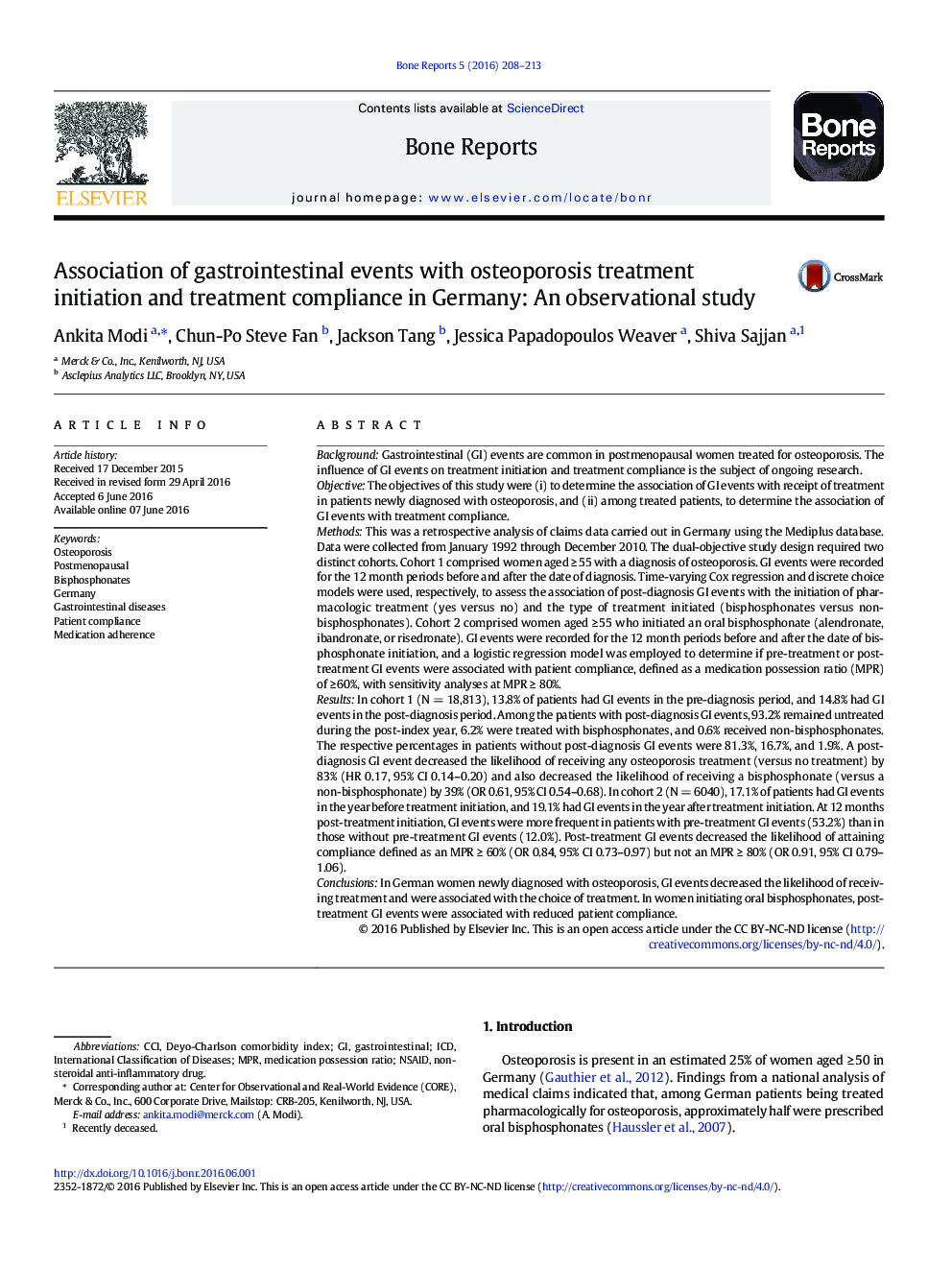| کد مقاله | کد نشریه | سال انتشار | مقاله انگلیسی | نسخه تمام متن |
|---|---|---|---|---|
| 2792323 | 1568667 | 2016 | 6 صفحه PDF | دانلود رایگان |
• Among patients diagnosed with osteoporosis, 16.9% received pharmacotherapy in the year following the diagnosis.
• Bisphosphonates were the most commonly prescribed pharmacotherapy in German osteoporosis patients.
• In women newly diagnosed with osteoporosis, GI events decreased the likelihood of receiving treatment.
• GI events were associated with the choice of treatment among women newly diagnosed with osteoporosis.
• In women initiating oral bisphosphonates, post-treatment GI events were associated with reduced patient compliance.
BackgroundGastrointestinal (GI) events are common in postmenopausal women treated for osteoporosis. The influence of GI events on treatment initiation and treatment compliance is the subject of ongoing research.ObjectiveThe objectives of this study were (i) to determine the association of GI events with receipt of treatment in patients newly diagnosed with osteoporosis, and (ii) among treated patients, to determine the association of GI events with treatment compliance.MethodsThis was a retrospective analysis of claims data carried out in Germany using the Mediplus database. Data were collected from January 1992 through December 2010. The dual-objective study design required two distinct cohorts. Cohort 1 comprised women aged ≥ 55 with a diagnosis of osteoporosis. GI events were recorded for the 12 month periods before and after the date of diagnosis. Time-varying Cox regression and discrete choice models were used, respectively, to assess the association of post-diagnosis GI events with the initiation of pharmacologic treatment (yes versus no) and the type of treatment initiated (bisphosphonates versus non-bisphosphonates). Cohort 2 comprised women aged ≥ 55 who initiated an oral bisphosphonate (alendronate, ibandronate, or risedronate). GI events were recorded for the 12 month periods before and after the date of bisphosphonate initiation, and a logistic regression model was employed to determine if pre-treatment or post-treatment GI events were associated with patient compliance, defined as a medication possession ratio (MPR) of ≥ 60%, with sensitivity analyses at MPR ≥ 80%.ResultsIn cohort 1 (N = 18,813), 13.8% of patients had GI events in the pre-diagnosis period, and 14.8% had GI events in the post-diagnosis period. Among the patients with post-diagnosis GI events, 93.2% remained untreated during the post-index year, 6.2% were treated with bisphosphonates, and 0.6% received non-bisphosphonates. The respective percentages in patients without post-diagnosis GI events were 81.3%, 16.7%, and 1.9%. A post-diagnosis GI event decreased the likelihood of receiving any osteoporosis treatment (versus no treatment) by 83% (HR 0.17, 95% CI 0.14–0.20) and also decreased the likelihood of receiving a bisphosphonate (versus a non-bisphosphonate) by 39% (OR 0.61, 95% CI 0.54–0.68). In cohort 2 (N = 6040), 17.1% of patients had GI events in the year before treatment initiation, and 19.1% had GI events in the year after treatment initiation. At 12 months post-treatment initiation, GI events were more frequent in patients with pre-treatment GI events (53.2%) than in those without pre-treatment GI events (12.0%). Post-treatment GI events decreased the likelihood of attaining compliance defined as an MPR ≥ 60% (OR 0.84, 95% CI 0.73–0.97) but not an MPR ≥ 80% (OR 0.91, 95% CI 0.79–1.06).ConclusionsIn German women newly diagnosed with osteoporosis, GI events decreased the likelihood of receiving treatment and were associated with the choice of treatment. In women initiating oral bisphosphonates, post-treatment GI events were associated with reduced patient compliance.
Journal: Bone Reports - Volume 5, December 2016, Pages 208–213
